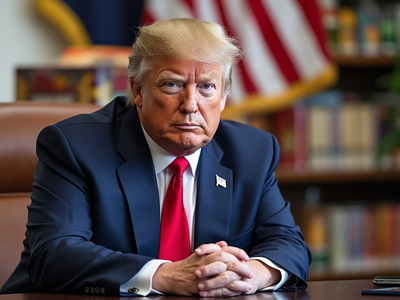New Oil Sanctions May Undermine American Influence
U.S. Administration Imposes Additional Sanctions Amid Concerns Over Global Oil Markets and Economic Impact
In recent developments, the Trump administration has intensified its approach to international oil sanctions, particularly targeting Asian companies that transport Iranian oil to China.
This move comes during a rapid diplomatic tour through the Middle East and is part of a broader strategy that includes potential additional sanctions against Russia, following similar measures from European countries.
While the imposition of tariffs and sanctions is not new for U.S. foreign policy—having been increasingly utilized since 2001—the current administration appears particularly eager to leverage these tools across various sectors, including sensitive technology and finance, targeting entities that might be perceived as threats to U.S. economic interests.
Historically, significant sanctions have had mixed results, often prompting the targeted nations to adapt and seek alternative trading routes or partnerships.
For instance, following the onset of the war between Russia and Ukraine in 2022, both the United States and Europe imposed sanctions on Russian oil exports.
These measures aimed to cripple the Russian economy but were carefully calibrated to avoid an excessive spike in global oil prices.
Thus, allowances were made for Russian oil sales to non-Western countries, but at a price cap set below market value, specifically under $60 per barrel.
Economic analyses indicate that these sanctions have indeed caused some disruption in Russian oil exports.
Research from the Federal Reserve Bank of Dallas points to significant discounts accepted by Russia when redirecting its oil exports to markets in India.
For example, in March 2023, Russia reportedly had to concede a $32 discount on Urals crude compared to prices in January 2022 as a result of heightened shipping costs and India's growing bargaining power.
Nevertheless, the emergence of clandestine “shadow fleets” has enabled Russia to circumvent some restrictions, facilitating a parallel oil trade network that operates outside of recognized international controls.
Recent studies utilizing machine learning models reveal that between 2017 and 2023, commercial vessels transported an estimated 9.3 million metric tons of crude oil per month, accounting for nearly half of global sea-borne oil exports, with China commanding 15% of this trade volume.
In response, U.S. officials have moved to impose sanctions against Hong Kong-based companies engaged in facilitating this oil trade.
Analysts emphasize that sanctions are most effective when promptly implemented, clearly targeted, and broadly supported by global allies.
However, there are questions regarding the Trump administration's ability to secure such support, particularly given past tensions over tariff policies that have strained relations with key allies.
The prior efforts to restrict technology exports to China have also yielded mixed outcomes, as China has made significant strides in developing its domestic technology capabilities and has employed third-party entities to circumvent restrictions.
Similarly, U.S. measures removing Russia from the SWIFT financial messaging system succeeded in dramatically reducing trade between Russia and Western countries, but were less effective in curtailing trade with non-Western states.
Evidence suggests that an increased use of local currencies in bilateral trade with developing nations has mitigated many impacts of SWIFT sanctions.
As tensions mount, the Trump administration has outlined potential tariffs of up to 100% on countries developing non-dollar payment systems, testing the resilience of the dollar’s dominance in global trade.
However, historical precedents caution that, while sanctions can be effective under certain conditions, they must be applied judiciously and in concert with allied nations to avoid unintended negative consequences.
The current focus on Iranian oil sanctions remains acute, with observers noting a recent decrease in oil prices following indications of progress in negotiations with Tehran.
The outcomes of these diplomatic efforts could significantly impact the effectiveness of the U.S. administration's sanctions strategy and highlight the challenges faced in asserting economic influence in an increasingly complex global landscape.
This move comes during a rapid diplomatic tour through the Middle East and is part of a broader strategy that includes potential additional sanctions against Russia, following similar measures from European countries.
While the imposition of tariffs and sanctions is not new for U.S. foreign policy—having been increasingly utilized since 2001—the current administration appears particularly eager to leverage these tools across various sectors, including sensitive technology and finance, targeting entities that might be perceived as threats to U.S. economic interests.
Historically, significant sanctions have had mixed results, often prompting the targeted nations to adapt and seek alternative trading routes or partnerships.
For instance, following the onset of the war between Russia and Ukraine in 2022, both the United States and Europe imposed sanctions on Russian oil exports.
These measures aimed to cripple the Russian economy but were carefully calibrated to avoid an excessive spike in global oil prices.
Thus, allowances were made for Russian oil sales to non-Western countries, but at a price cap set below market value, specifically under $60 per barrel.
Economic analyses indicate that these sanctions have indeed caused some disruption in Russian oil exports.
Research from the Federal Reserve Bank of Dallas points to significant discounts accepted by Russia when redirecting its oil exports to markets in India.
For example, in March 2023, Russia reportedly had to concede a $32 discount on Urals crude compared to prices in January 2022 as a result of heightened shipping costs and India's growing bargaining power.
Nevertheless, the emergence of clandestine “shadow fleets” has enabled Russia to circumvent some restrictions, facilitating a parallel oil trade network that operates outside of recognized international controls.
Recent studies utilizing machine learning models reveal that between 2017 and 2023, commercial vessels transported an estimated 9.3 million metric tons of crude oil per month, accounting for nearly half of global sea-borne oil exports, with China commanding 15% of this trade volume.
In response, U.S. officials have moved to impose sanctions against Hong Kong-based companies engaged in facilitating this oil trade.
Analysts emphasize that sanctions are most effective when promptly implemented, clearly targeted, and broadly supported by global allies.
However, there are questions regarding the Trump administration's ability to secure such support, particularly given past tensions over tariff policies that have strained relations with key allies.
The prior efforts to restrict technology exports to China have also yielded mixed outcomes, as China has made significant strides in developing its domestic technology capabilities and has employed third-party entities to circumvent restrictions.
Similarly, U.S. measures removing Russia from the SWIFT financial messaging system succeeded in dramatically reducing trade between Russia and Western countries, but were less effective in curtailing trade with non-Western states.
Evidence suggests that an increased use of local currencies in bilateral trade with developing nations has mitigated many impacts of SWIFT sanctions.
As tensions mount, the Trump administration has outlined potential tariffs of up to 100% on countries developing non-dollar payment systems, testing the resilience of the dollar’s dominance in global trade.
However, historical precedents caution that, while sanctions can be effective under certain conditions, they must be applied judiciously and in concert with allied nations to avoid unintended negative consequences.
The current focus on Iranian oil sanctions remains acute, with observers noting a recent decrease in oil prices following indications of progress in negotiations with Tehran.
The outcomes of these diplomatic efforts could significantly impact the effectiveness of the U.S. administration's sanctions strategy and highlight the challenges faced in asserting economic influence in an increasingly complex global landscape.











